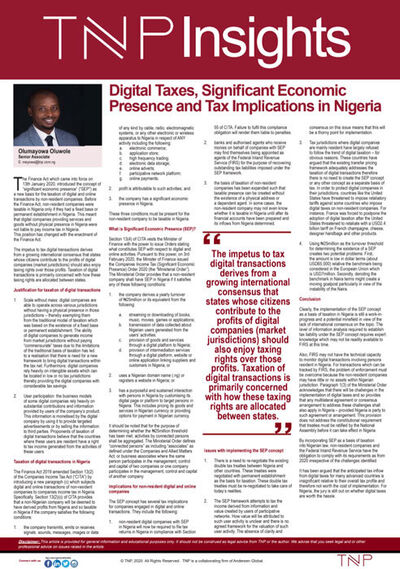The Finance Act which came into force on 13th January 2020, introduced the concept of “significant economic presence” (“SEP”) as a new basis for the taxation of digital and online transactions by non-resident companies. Before the Finance Act, non-resident companies were taxable in Nigeria only if they had a fixed base or permanent establishment in Nigeria. This meant that digital companies providing services and goods without physical presence in Nigeria were not liable to pay income tax in Nigeria.
This position has changed with the enactment of the Finance Act.
The impetus to tax digital transactions derives from a growing international consensus that states whose citizens contribute to the profits of digital companies (market jurisdictions) should also enjoy taxing rights over those profits. Taxation of digital transactions is primarily concerned with how these taxing rights are allocated between states.
Justification for taxation of digital transactions
- Scale without mass: digital companies are able to operate across various jurisdictions without having a physical presence in those jurisdictions – thereby exempting them from the traditional model of taxation which was based on the existence of a fixed base or permanent establishment. The ability of digital companies to generate income from market jurisdictions without paying “commensurate” taxes due to the limitations of the traditional basis of taxation has led to a realisation that there is need for a new framework to bring digital transactions within the tax net. Furthermore, digital companies rely heavily on intangible assets which can be located in low or no tax jurisdictions thereby providing the digital companies with considerable tax savings.
- User participation: the business models of some digital companies rely heavily on substantial contributions and information provided by users of the company’s product. This information is monetised by the digital company by using it to provide targeted advertisements or by selling the information to third parties. Proponents of taxation of digital transactions believe that the countries where these users are resident have a right to tax income generated from the activities of these users.
Taxation of digital transactions in Nigeria
The Finance Act 2019 amended Section 13(2) of the Companies Income Tax Act (“CITA”) by introducing a new paragraph (c) which subjects digital and online transactions of non-resident companies to companies income tax in Nigeria. Specifically, Section 13(2)(c) of CITA provides that a non-Nigerian company will be deemed to have derived profits from Nigeria and so taxable in Nigeria if the company satisfies the following conditions:


